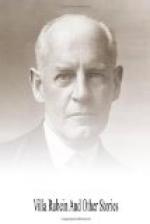Scorrier shook his head. All night, jolting along a rough track cut through the forest, he thought of Pippin. The other miseries of this calamity at present left him cold; he barely thought of the smothered men; but Pippin’s struggle, his lonely struggle with this hydra-headed monster, touched him very nearly. He fell asleep and dreamed of watching Pippin slowly strangled by a snake; the agonised, kindly, ironic face peeping out between two gleaming coils was so horribly real, that he awoke. It was the moment before dawn: pitch-black branches barred the sky; with every jolt of the wheels the gleams from the lamps danced, fantastic and intrusive, round ferns and tree-stems, into the cold heart of the forest. For an hour or more Scorrier tried to feign sleep, and hide from the stillness, and overmastering gloom of these great woods. Then softly a whisper of noises stole forth, a stir of light, and the whole slow radiance of the morning glory. But it brought no warmth; and Scorrier wrapped himself closer in his cloak, feeling as though old age had touched him.
Close on noon he reached the township. Glamour seemed still to hover over it. He drove on to the mine. The winding-engine was turning, the pulley at the top of the head-gear whizzing round; nothing looked unusual. ‘Some mistake!’ he thought. He drove to the mine buildings, alighted, and climbed to the shaft head. Instead of the usual rumbling of the trolleys, the rattle of coal discharged over the screens, there was silence. Close by, Pippin himself was standing, smirched with dirt. The cage, coming swift and silent from below, shot open its doors with a sharp rattle. Scorrier bent forward to look. There lay a dead man, with a smile on his face.
“How many?” he whispered.
Pippin answered: “Eighty-four brought up—forty-seven still below,” and entered the man’s name in a pocket-book.
An older man was taken out next; he too was smiling—there had been vouchsafed to him, it seemed, a taste of more than earthly joy. The sight of those strange smiles affected Scorrier more than all the anguish or despair he had seen scored on the faces of other dead men. He asked an old miner how long Pippin had been at work.
“Thirty hours. Yesterday he wer’ below; we had to nigh carry mun up at last. He’s for goin’ down again, but the chaps won’t lower mun;” the old man gave a sigh. “I’m waiting for my boy to come up, I am.”
Scorrier waited too—there was fascination about those dead, smiling faces. The rescuing of these men who would never again breathe went on and on. Scorrier grew sleepy in the sun. The old miner woke him, saying: “Rummy stuff this here chokedamp; see, they all dies drunk!” The very next to be brought up was the chief engineer. Scorrier had known him quite well, one of those Scotsmen who are born at the age of forty and remain so all their lives. His face—the only one that wore no smile—seemed grieving that duty had deprived it of that last luxury. With wide eyes and drawn lips he had died protesting.




